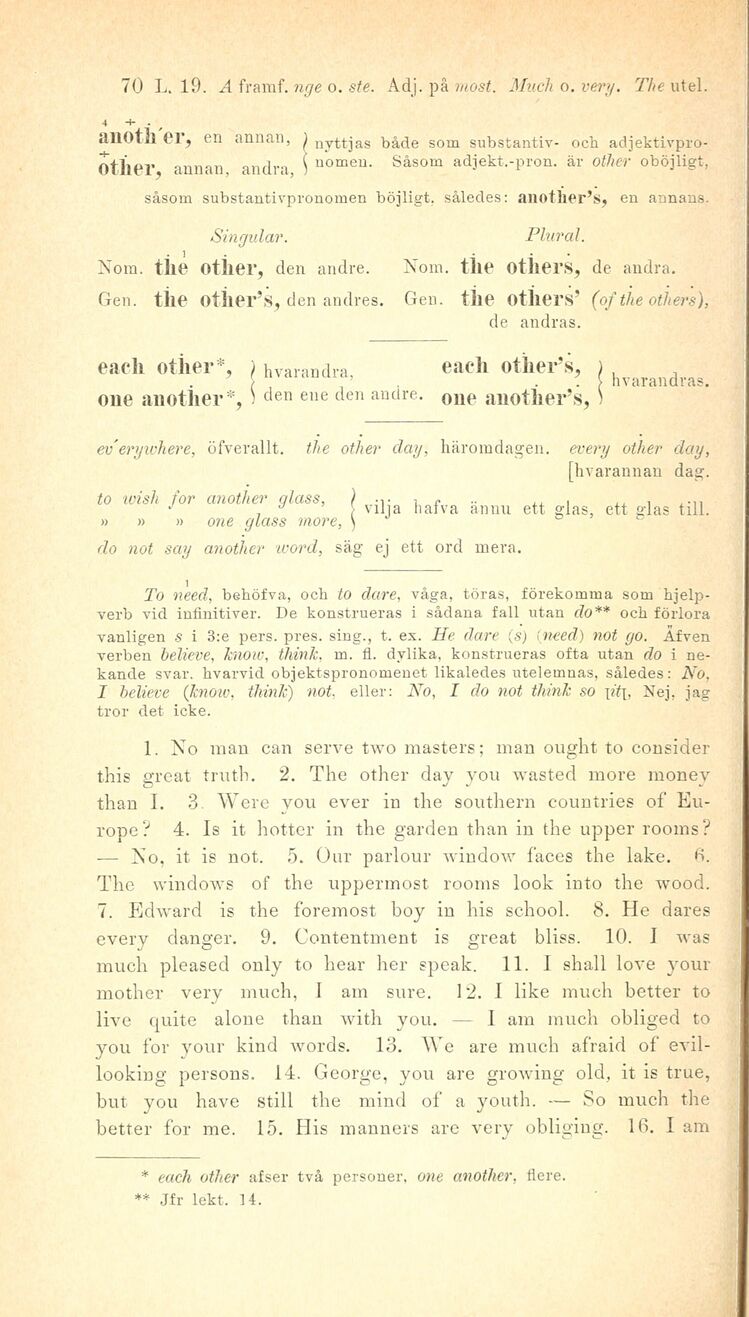
Full resolution (JPEG) - On this page / på denna sida - Sidor ...

<< prev. page << föreg. sida << >> nästa sida >> next page >>
Below is the raw OCR text
from the above scanned image.
Do you see an error? Proofread the page now!
Här nedan syns maskintolkade texten från faksimilbilden ovan.
Ser du något fel? Korrekturläs sidan nu!
This page has never been proofread. / Denna sida har aldrig korrekturlästs.
T.. 10. A framf. nge o. ste. Adj. på most. Much o. very. The utel. 60
4 H- .
anotll’er, en annan,
■+- .
Other, annan, andra,
såsom substantivpronomen böjligt, således: another’s, en annans.
Singular. Plural.
Nom. the otiier, den andre. Nom. the Others, de andra.
Gen. tiie other’s, den andres. Gen. the Others’ (of the others),
de andras.
each other*, ) hvarandra, each other’s,
one another*, S den eue den andre- one another’s,
ev’eryivhere, öfverallt, the other clay, häromdagen, every other clay,
[hvarannan dag.
to ivish for another glass,
» n » one glass more,
do not say another word, säg ej ett ord mera.
To need, behöfva, och to clare, våga, töras, förekomma som
hjelp-verb vid infinitiver. De konstrueras i sådana fall utan do** och förlora
vanligen s i 3:e pers. pres. sing., t. ex. He dare (s) (need) not go. Äfven
verben believe, know, think, m. fl. dylika, konstrueras ofta utan do i
nekande svar. hvarvid objektspronomenet likaledes utelemnas, således: No,
I believe (know, think) not, eller: No, I do not think so lit[, Nej, jag
tror det icke.
1. No man can serve two masters; man ought to consider
this great truth. 2. The other dav you wasted more money
o •/
than I. 3 Were you ever in the southern countries of
Europe? 4. Is it hotter in the garden than in the upper rooms?
-— No, it is not. 5. Our parlour window faces the lake. 6.
The windows of the uppermost rooms look into the Avood.
7. Edward is the foremost boy in his school. 8. He dares
every danger. 9. Contentment is great bliss. 10. I was
much pleased only to hear her speak. 11. I shall love your
mother very much, I am sure. 12. I like much better to
live quite alone than with you. — I am much obliged to
you for your kind words. 13. We are much afraid of
evil-looking persons. 14. George, you are growing old, it is true,
but you have still the mind of a youth. — So much the
%j J
better for me. 15. His manners arc very obliging. 16. 1 am
* each other afser två personer, one another, flere.
** Jfr lekt. 14.
nyttjas både som substantiv- och
adjektivpro-nomeu. Såsom adjekt.-pron. är other oböjligt,
hvarandras.
vilja hafva ännu ett glas, ett glas till.
<< prev. page << föreg. sida << >> nästa sida >> next page >>